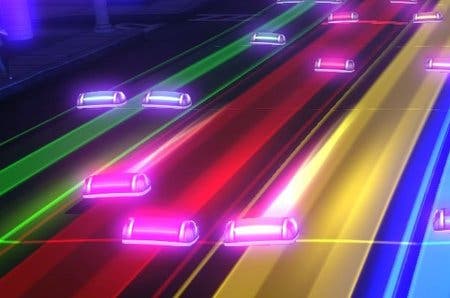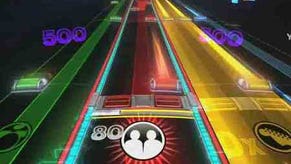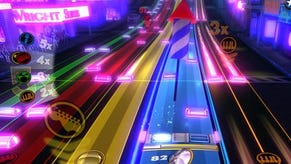Rock Band Blitz Review
Hope you enjoy our new direction.
Whenever a band's popularity starts to wane, it's common to see them declaring a return to their roots or taking a swerve towards the mainstream in an attempt to win over fresh fans. As for rock bands, so it is for Rock Band.
Following lacklustre sales for the ambitious Rock Band 3, this downloadable entry in the series finds Harmonix ditching the plastic guitars and heading back to the controller-based rhythm gaming it pioneered with FreQuency and Amplitude. It's also a much more casual and accessible experience than previous Rock Bands, with no way of failing a song and a structure that actively encourages you to miss notes in pursuit of higher scores.
Gone, too, is the party-friendly multiplayer core of Rock Band. This is a single-player only game, with one controller handling drums, bass, guitar, vocals and keyboards. Each instrument gets its own track, scrolling down the screen in the familiar style, and each track has notes on the left or right. There are various control configurations available, but the default one has you using triggers or shoulder buttons to shuttle between tracks, and twanging the twin sticks to hit those left and right notes. It definitely feels strange when so much of the presentation leads your fingers to expect an instrument peripheral, but two concise tutorials get you up to speed without fuss.
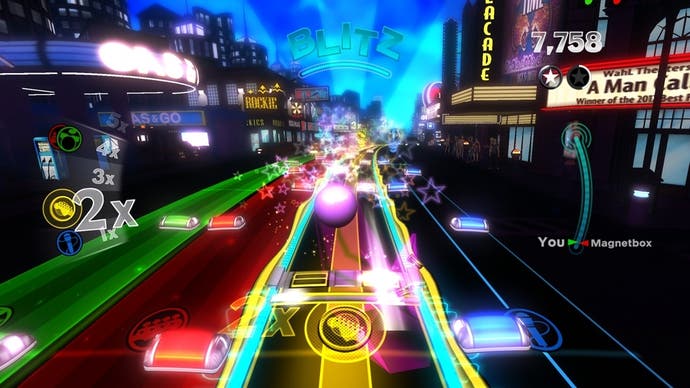
It's the scoring where Rock Band Blitz deviates most obviously from music game expectations. Each instrument track delivers multipliers for consistent performance, filling up with colour as you hit notes. This multiplier won't drop if you miss notes, and if you can fill the multipliers on all tracks before reaching the next checkpoint then the maximum multiplier is increased across the board. Elevating your scoring bonuses by 20 times or more, this is the key to getting the really massive scores.
There's also Blitz mode, which activates during perfect runs of notes hit and increases your score even further, provided you can sustain the run without making a mistake. This is as close as the game gets to the demanding finger-work of Rock Bands past, but even this precision is outweighed by a deluge of power-ups that more than compensate for sloppy timing.
Purchased using coins earned in each song, power-ups fall into three categories. Overdrive power-ups use the familiar energy system from previous games - hit the white notes, fill up your power bar and then unleash it at will. From a simple 2x multiplier to shockwaves and rockets that blast distant notes, these are your short-term score top-ups.
Track power-ups mostly just boost the score for a particular instrument track - handy if you're about to play a song where you know one instrument dominates. Finally, note power-ups are triggered by hitting glowing purple note blocks. The most basic simply detonates the block in question, hitting those nearby. Later unlocks grant you such bonuses as flaming blocks that must be followed as they spread across the tracks, cars that careen into the distance, destroying notes as they go, and a pinball that can be kept in play by bouncing it back into the screen.
All these bonuses, power-ups and multipliers combine to form a game with admirable freedom as to how you chase that elusive leaderboard glory. Certain tactics work better for certain songs, but you can easily unlock enough power-ups in the first few hours of play to start experimenting. Find a groove that works and it's enormous fun.
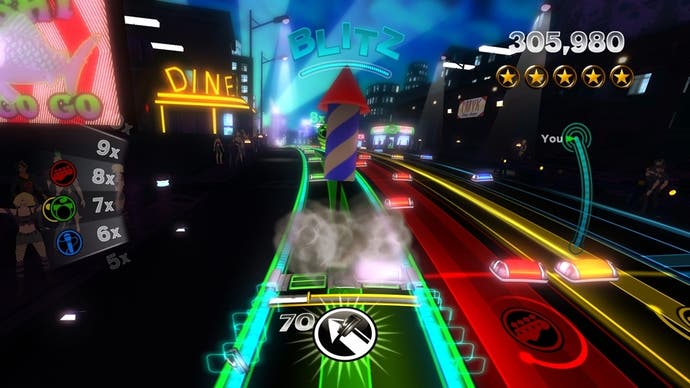
This ruthless focus on myriad ways of scoring can't help but detract from the heart of Rock Band, though. This is a game that demands constant attention across multiple tracks, looking for the most point-rich sections, scanning the horizon for upcoming purple note blocks, cranking up the multipliers before the next checkpoint. It's exhausting, in a fun way, but it also means that the music often gets shoved to the sidelines. You can play a song and concentrate solely on one track to hit all the notes with precision and the Rock Band satisfaction is still there, but you'll struggle to get any sort of score worth celebrating. With no way of failing, there's not much incentive to nail that solo.
Playing the game as intended, literally chasing scoring opportunities all over the screen and ditching one instrument for another if it means more points, means waving goodbye to that amazing synaesthetic feeling you get with a guitar in hand, where you inhabit a song, feeling the music and seeing the shape of it as the notes tumble towards you; hands, ears and eyes in perfect coordination. Harmonix still does a great job of visualising notes as on-screen cues, but seems so intent on making you pursue those high scores that the deep musical immersion we've come to expect from the series has been all but smothered in a fidgety, restless coating that distracts as often as it thrills, with the bloops and swooshes of multipliers and power-ups competing with the actual music for your attention.
Your long-term relationship with the game will depend largely on how many of your friends are playing, making the leaderboard battles and asynchronous "score wars" more interesting than simply competing against random names - and even more on your willingness to fork out for downloadable songs.
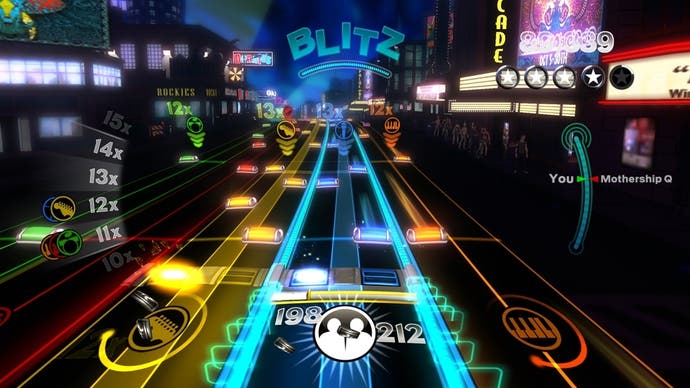
It's here that the value of Blitz becomes complicated. If you're a Rock Band fan, then the fact that all 25 of Blitz's songs can be imported into the main game and played with instruments is immediately appealing - at 1200 Microsoft Points, you can easily view it as an affordable track pack with a bonus game attached.
Your library of existing downloaded songs also works the other way, appearing in Blitz for controller play. That's essential to enjoying the game for more than a few evenings, as you'll burn through the titles included very quickly. Indeed, the game is clearly skewed to players who will keep their library refreshed. You get 300 bonus coins for playing a new song, and the front end is constantly suggesting new tracks that you don't own, but could if you'd only hit that "purchase" button.
The disc-based games could afford to treat DLC as an optional extra, not least because the more demanding gameplay meant each song lasted longer as well as having the appeal of being playable in a party setting with your friends. Here, you'll burn through all the tracks in a few lonely sessions - and when 100 of the 500 available Gamerscore can only be earned by beefing up the default Blitz library with DLC, it feels more than a little mercenary.
So who is Rock Band Blitz for? The newcomer to the series, who doesn't want to fork out for plastic instruments but will instead have to start downloading songs almost immediately to keep the game fresh - or the die-hard fans who have hundreds of tracks ready to go and the finger speed to dominate, but who are more likely to grow tired of different gameplay pace? It's hard to say, and it feels like Harmonix isn't entirely sure of the answer either.
Rock Band Blitz certainly isn't the Jazz Odyssey of the series, but its shortcomings taint its good intentions. There's plenty to like here, and Blitz is an undeniably enjoyable arcade game in short bursts. But it feels like an awkward offshoot for the Rock Band name, a little desperate in its push to get people downloading more songs, and an altogether lightweight experience that is unlikely to reverse the decline of the music genre.
